- Home
- Tim Tingle
No More No Name Page 9
No More No Name Read online
Page 9
“We pulled into the burger joint and four angels dropped from the sky. Actually, it was a carful of sweet Panther high school girls, munching on burgers and fries.
“I parked next to ’em and we started the talk. Things were going hoke till they saw us swigging the beer. They rolled their windows up and drove away. Well, angels or not, this was no way to treat Panther basketball players! No way.
“So we drove after them. I must have been a bit more inebriated than I thought, Bobby. Know what ‘inebriated’ means?”
“Yes, Dad. It was on a vocabulary test last week.”
“What?” Mom said. “A word that means ‘drunk’ was on your vocabulary test?”
“Only kidding,” I said, motioning for Dad to keep talking.
“This is the hard part, son. Not because I’m ashamed. I have done so many things I’m ashamed of, and you two are still with me. No, it’s hard because I don’t remember much of anything after pulling away from the hamburger joint.
“It was Sammy Tom’s car, but I was at the wheel. He asked me to drive, so he could get stinking drunk, as he put it. I think I out-drunked him.
“Nobody was hurt, but the car was totaled. Some fool planted a tree too close to the highway. I woke up in the back seat of a patrol car.
“Dad told the cops he wasn’t about to get me out of jail in the middle of the night. Can’t say I blame him. Besides, he’d been drinking whiskey since he got home from work that afternoon. Just like every other day. Excepting weekends, when he’d take his first swig right after breakfast.”
Mom reached for my hand and held it tight. In the old days, she would have reached under the table. But we were all in this together now. No need to hide.
“Your grandma came and bailed me out the next morning, apparently without telling Dad what she was gonna do. But his friends at the courthouse called him. As I was walking down the courthouse steps, he comes speeding around the corner in his old pickup truck. He came to a screeching halt in front of the courthouse. Didn’t even try to park. He left his engine running and his truck in the middle of the road.”
“Oh, Buck,” Mom said. “It feels so real, like this was yesterday.”
“Same for me,” Dad said. “But I gotta go on.”
He looked at me before he spoke again. “Bobby, I am so sorry for everything I did to hurt you. This has to stop. No more in our family. Not ever.”
I paused for just an instant. I knew he felt this way, but now he was actually saying it. Not ever. No more.
“I am with you, Dad. You know that.”
“Yes, I do, Bobby. Yes, I do.” He ran his hand through his hair and rubbed the back of his neck. Then he continued.
“My dad slammed his door shut and rounded the truck. Mom and I stopped. She eased in front of me, but he was having none of that. He grabbed her by the arm and yanked her aside. I stood maybe four steps above the sidewalk. Dad stared hard at me. ‘You’ll be sorry you ever did this to your mother,’ he said.
“Then he balled up his fist, leaned back, and hit me in the jaw. Harder than I’ve ever been hit in my life—to this day.”
“Dad,” I said. “I know I should be quiet and listen. But I have to say something. You never hit me. I know you feel terrible about how you were. But you never balled up your fist and slugged me.”
“Bobby, I did shake my fist at you.”
“But you never hit me.”
“I shoved you. I . . . I never hit you because I could never get this out of my mind. I kept seeing my father standing over me, watching as I rolled down the courthouse steps to the sidewalk.”
“Bobby,” Mom said, “you will never be this way. Your dad has changed, and you have forgiven him. And so have I.”
“I never forgave my father,” Dad said. “We never made peace.”
“Dad, you know what the Choctaw elders say. The old ones never leave us.”
“So you think I can still make my peace with him?”
I said nothing. I wanted Dad to answer for himself.
“Maybe when the days warm up, early spring, we can visit my dad’s grave. You’ve been there once, Bobby. But you were too young to remember.”
“I’d like to go, Dad. We can sing ‘Shilombish Holitopa Ma’ together. Your father would like that.”
“‘Amazing Grace’ in Choctaw,” Dad said. “Yes, I like that idea.”
A sudden gust of wind blew my dad’s cap off his head. He smiled and whispered, “I love you too, Dad.”
Watching Mom and Dad at the picnic table, I thought of the past year. I have learned so much. I learned that booze and bullying starts at home. Dad was raised in a home filled with more hurt and pain than I ever knew.
And when he grew up, he had to take his anger out on somebody. But my dad was not like his dad, and something in him, some hidden seed of caring for others, was finally allowed to grow.
I have—at last—my family.
Lloyd needs me, and I will be there for him, for the rest of our lives. And while Lloyd’s father stews with hatred, and Heather blames everyone else for her problems, I know I cannot let their dark feelings steal the light from my life.
My mind drifted to Faye. Mystery Lady Faye. She was still worried about Heather. But with her tormentor gone from school, things had to get better. Maybe not perfect, but better. And I’ll be there for Faye, just like she’s always been there for me.
With my next thought I had to smile, so big and childlike that Mom said, “I think you need to tell us what’s going on.”
“Oh, nothing,” I said. “At least nothing I wanna share with Dad. He’d make fun of me,” I whined.
“Anybody in their right mind would make fun of a silly little punk like you, kid,” Dad said, doing his best to act like he meant it.
“Hoke, Mom. If he wants to tease me, let’s remind him who’s the real basketball-playing dude of the Byington household.”
As soon as I said it, I wished I hadn’t.
“Hey, Dad! You know I didn’t mean it!”
“That’s hoke, Bobby,” Dad said, and it was his time to whine. “I know I’m a loser.”
“You’re the biggest winner I know, Dad,” I said, reaching for his hand. He brushed it aside and fist-bumped me instead. Then Dad did something I had never seen him do.
Hoke, I guess this is a day full of things I’ve never seen Dad do!
He started drumming on the picnic table. Not Indian powwow drumming, but rock drumming, and right away I recognized the rhythm. Soon he began singing that Led Zeppelin song—the song that played when I crashed Johnny’s car through the fence and almost drowned.
In the days of my youth
I was told what it means to be a man.
Now I’ve reached that age,
I’ve tried to do all those things the best I can.
No matter how I try, I find my way into the same old jam.
Good times, bad times,
You know I’ve had my share.
I had to tell him. If we ever really hoped to be close, he had to know about that night. He had to see it through my eyes.
“Dad,” I said.
“Yes, Bobby.”
“Can I tell you what goes through my mind when I hear that song?”
“I gave you that CD, didn’t I?”
“Yes, Dad. And I was playing it when I drove Johnny’s car into the lake.”
“Oh, son!” he said, and I knew he was about to cry. “I am so sorry. I didn’t mean to bring back that night.”
“No, Dad! Please, listen to me.”
He looked at Mom and shook his head. “I didn’t know,” he said.
“Dad, let me finish. Please. When I think about that night, I don’t remember crashing through the fence. I don’t remember the car sinking into the lake. What I see—and what I never want to forget—is you, Dad. You! Reaching out your arms to me and patting your fist to your chest. You! Letting me know you loved me. That is what I remember, Dad.”
“And I always will, Bobby
. I always will.” He leaned over to me and hugged me tight, a warm father-and-son hug. I didn’t look at Mom, but I knew she had to be crying too.
“Bobby,” she said, “do you remember the song I taught you when you were a little one?”
“Nope,” I muttered, and Dad laughed because I was still caught in his snuggle. I lifted my face from Dad’s grip and curled my eyebrows in a question. So Mom began to sing.
This little light of mine,
And I joined in:
I’m gonna let it shine.
This little light of mine,
I’m gonna let it shine,
And not even trying to hide the tears streaming down his face, Dad chimed in on the final line.
Let it shine, let it shine, let it shine.
Dedicated to my football-playing dad,
Archie Tingle, Jr.,
and to Danny, my basketball brother,
who helped me dig the hole.
About the Author
Tim Tingle is an Oklahoma Choctaw and an award-winning author and storyteller. Every Labor Day, Tingle performs a Choctaw story before the Chief’s State of the Nation Address, a gathering that attracts over ninety thousand tribal members and friends.
In June 2011, Tingle spoke at the Library of Congress and presented his first performance at the Kennedy Center in Washington, DC. From 2011 to the present, he has been a featured author and storyteller at Choctaw Days, a celebration at the Smithsonian’s National Museum of the American Indian honoring the Oklahoma Choctaws.
Tingle’s great-great-grandfather, John Carnes, walked the Trail of Tears in 1835. In 1992, Tim retraced the Trail to Choctaw homelands in Mississippi and began recording stories of tribal elders. His first book, Walking the Choctaw Road, was the outcome. His first children’s book, Crossing Bok Chitto, garnered over twenty state and national awards and was an Editor’s Choice in the New York Times Book Review. Danny Blackgoat: Navajo Prisoner, Tim’s first PathFinders novel, was an American Indian Youth Literature Awards Honor Book in 2014.

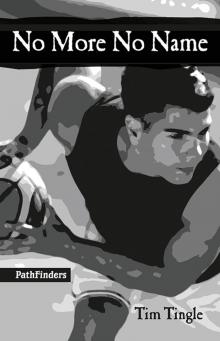 No More No Name
No More No Name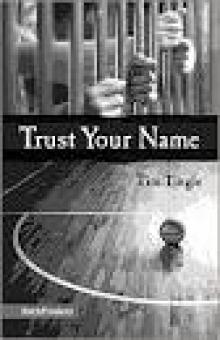 Trust Your Name
Trust Your Name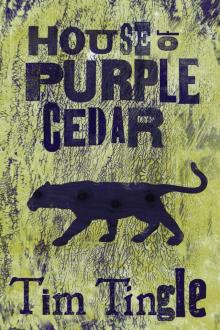 House of Purple Cedar
House of Purple Cedar NO-NAME
NO-NAME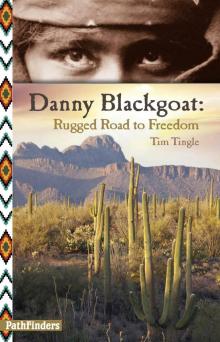 Danny Blackgoat: Rugged Road to Freedom
Danny Blackgoat: Rugged Road to Freedom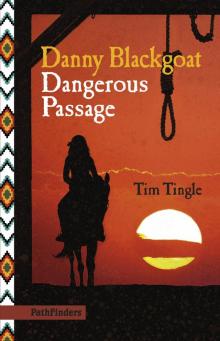 Danny Blackgoat
Danny Blackgoat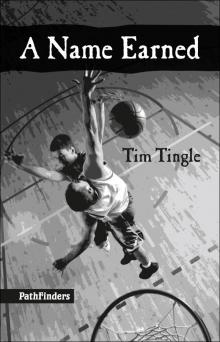 A Name Earned
A Name Earned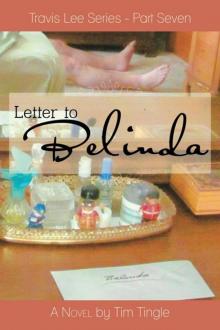 Letter to Belinda
Letter to Belinda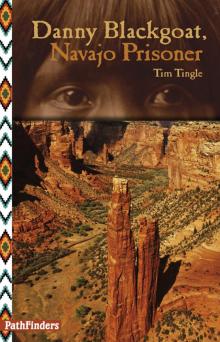 Danny Blackgoat, Navajo Prisoner
Danny Blackgoat, Navajo Prisoner